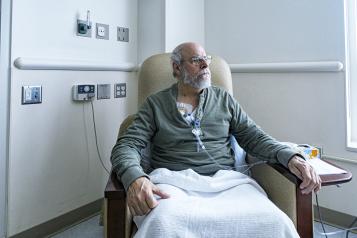Our position on cancer care

One in two people will develop cancer during their lifetime in the UK. The NHS Long Term Plan, which looks at future planning of the NHS, aims to improve cancer diagnosis and treatment. We informed the plan with over 5,000 experiences of people with cancer.
We're calling for:
- People with cancer to receive timely, compassionate, high-quality cancer care. The NHS needs an appropriately resourced workforce plan to support the ambition to meet national waiting times targets for cancer, among other areas, which have not met for several years.
- Improving access to primary care. Delays to GP appointments and referrals have a knock-on effect on every part of cancer treatment, resulting in people waiting longer for assessment and diagnosis.
- Personalised aftercare support, including a post-treatment care plan, appropriate home equipment, and clarity on who to contact if their condition changes or symptoms recur.
- Accessible information on treatment for everyone, including those with sensory impairments, disabilities, or language barriers.
- Improving communication with patients about their cancer referrals, including:
- Training and hiring more care navigators to improve access to general practice.
- Ensuring all practice use e-referrals systems and NHS England to improve the online referrals tracker.
- Improving processes for patients to contact NHS teams about their condition following a referral.
Our evidence
In 2021/22, we heard from 684 people who had experienced cancer. Over half (53%) of these views were negative. Only one in four people (26%) had a positive experience. This represented a significant shift towards negative feedback compared to 2019, when 61% of cancer patients described their experiences positively.
Key findings from our research included:
• Long waiting times to speak to a GP during the pandemic meant long waits for referrals to cancer diagnostic and treatment services. This ‘hidden waiting list’ is not reflected in official statistics about waiting times for cancer diagnosis, which are measured from the point of referral by a GP.
• A concerning number of people said their concerns weren’t taken seriously by their GP, leading to instances of misdiagnosis.
• Routine screening and tests were cancelled during the pandemic, and there were long waits to hear the results. People also experienced long waits for treatment for their cancer.
• Once discharged, people weren’t offered adequate information or follow-up support, leaving them confused about what to do next.
• People with language barriers, people with learning disabilities and women about specific issues they faced when accessing cancer services. For example, people were not offered information about screening in formats they could understand or offered interpreters. Women more frequently reported feeling that GPs dismissed their symptoms or concerns.
One in ten people with suspected cancer said their referral did not progress to the next stage
Our recent research on GP referrals found that while 90% of those referred to a cancer specialist progressed directly to an appointment or joining a waiting list, one in ten people with suspected cancer told us their referral did not progress to the next stage. These people didn’t hear anything about the appointment, eventually found their referral or appointment hadn’t been made, or had their referral rejected.
Our work
While the goals of the Long Term Plan align with people’s needs, they have not been met so far.
There are still gaps in the Long Term Plan’s vision of cancer services. The impact of misdiagnosis was a key theme in our feedback, as was the importance of compassionate care. People emphasised the importance of information and advice being accessible to everyone, including people with learning disabilities and those with language barriers.
With overall sentiment becoming more negative, especially compared to other services, work is needed to implement the plan and ensure that people with cancer receive timely, high-quality cancer care.
Through our referrals research, we have made a series of recommendations to improve communication with patients regarding referrals, including giving patients and staff access to the same online system to track a referral from the point it is made. We are working with NHS England and the Department of Health and Social Care to action these improvements.
In 2023/24 we will be conducting new research on diagnostic hubs, to evaluate whether they are providing the additional diagnostic capacity promised and whether they are working well for patients.


